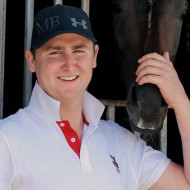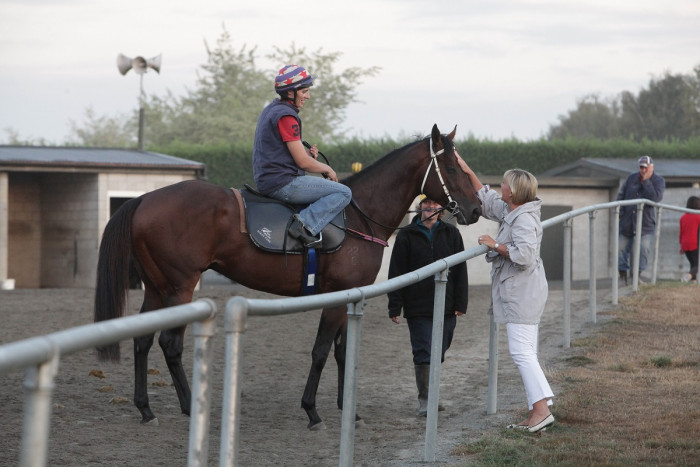Horse Trainer
Kaiwhakapakari Hōiho
Alternative titles for this job
Horse trainers train horses for racing, and are responsible for their care at a stable or race track.
Pay
Pay rates for horse trainers vary depending on their ability, experience and level of success.
Job opportunities
Pay
Pay for horse trainers varies depending on how they are employed, their experience and their horses' success. They may:
- charge a fee for training horses and receive a percentage of their horses' winnings
- train young horses and make their money by selling them
- work as a co-trainer and receive a weekly wage and a share of winnings.
Owner-trainers train a small number of their own horses. They may need to do additional jobs to supplement their income.
(This information is a guide only. Find out more about the sources of our pay information)
What you will do
Horse trainers may do some or all of the following:
- train horses to get used to riders, equipment and the racing environment
- organise training plans for horses and train them for racing
- ride horses on training tracks
- ensure horses are groomed and fed
- monitor horses' health
- communicate with horse owners
- train apprentice jockeys and stablehands
- market and sell horses at races and independently
- run their own business and manage staff.
Skills and knowledge
Horse trainers need to have:
- knowledge of horses' anatomy and their behaviour
- an understanding of horses' nutritional requirements, especially to improve performance
- good horse-handling skills
- knowledge of horse training methods
- an understanding of horse racing rules and procedures.
Horse trainers who employ staff must also have small business skills.
Working conditions
Horse trainers:
- usually start work early in the morning and finish late in the afternoon
- work weekends and longer hours on race days
- work at stables and racetracks
- work outdoors in most weather conditions
- travel to race meetings and trials throughout New Zealand, and sometimes overseas.
What's the job really like?

Robert Wellwood
Horse Trainer
Work hard and travel the world
“Seeing a horse I’ve trained win races, and travelling around New Zealand and Australia are the highlights of the job," says horse trainer Robert Wellwood.
“If you’ve got a horse good enough you can travel the world. But it takes a lot of patience.”
Understanding horse behaviour is important
Robert began riding at the age of four so a racing career seemed a natural progression. “It’s hands-on learning, so working as a stablehand can be good experience.
“You need to be good with animals. Training horses is like training athletes; they all respond differently. Some need a strict routine and extra help to excel, others love pats and cuddles or a special feed, but some just love to win!”
Managing a business keeps you busy
As a junior partner in the business, Robert manages staff and the racing careers of 45 horses. He selects horses to train, chooses races for each horse and updates owners with their progress.
"You can give yourself the best chance by choosing the better-bred horses, but sometimes it’s just determination and luck!"
Entry requirements
There are no specific requirements to become a horse trainer, but you usually need at least six years' experience working with horses. This can include work as a:
- stablehand
- trackwork rider
- stable foreperson
- pre-trainer/horse breaker
- jockey or apprentice jockey
- harness driver.
Completing an apprenticeship and gaining a National Certificate in Equine Studies (Level 3 and Level 4) may be useful.
- Primary Industry Training Organisation website - information on training in equine studies
- Harness Racing New Zealand website - information about National Certificates in Equine Studies
- More information about apprenticeships
Secondary education
A minimum of three years of secondary education is recommended.
Gateway opportunities for school students
For Year 11 to 13 learners, the Gateway programme is a good way to work towards national certificates through Harness Racing New Zealand and gain industry knowledge. This may include off-site learning and some on-the-job training.
Personal requirements
Horse trainers need to be:
- passionate about horses
- confident around horses
- patient and firm
- good communicators
- good at training and motivating staff
- dedicated and hard working.
You have to be good at communicating with the owners who are all around the world. It’s important they feel a part of it so you give them weekly updates on their horses.
Robert Wellwood
Horse Trainer
Useful experience
Useful experience for horse trainers includes working:
- as a jockey
- as a pre-trainer or horse breaker
- as a stablehand, stable foreperson or assistant trainer
- with horses in other ways.
Physical requirements
Horse trainers need to have a good level of fitness and health as the work can be physical and involve standing for long hours.
Registration
If you wish to train horses to compete at race meetings, you need to be licensed by the relevant organisation:
- New Zealand Thoroughbred Racing licenses people to train gallopers
- Harness Racing New Zealand licenses people to train trotters.
You need to meet standards set by the recognised racing authorities, which include being:
- over 18 or 20, depending on the type of licence
- financially sound and of good character
- able to provide suitable accommodation for horses
- considered competent to train horses.
Find out more about training
- Primary Industry Training Organisation (Primary ITO)
- (04) 801 9616 - info@primaryito.ac.nz - www.primaryito.ac.nz
What are the chances of getting a job?
Demand for horse trainers affected by COVID-19 pandemic
Opportunities for horse trainers, especially those new to the industry, have been affected by the racing industry's financial challenges.
However, the Government's announcement of an emergency support package for the industry may create new opportunities for horse trainers. New racetracks in Cambridge, Palmerston North and Christchurch may increase opportunities in these regions but the number of racing events at regional venues is expected to decrease.
The COVID-19 pandemic has further reduced opportunities for horse trainers.
Demand may improve slightly as restrictions to control the spread of the pandemic ease.
Horse Trainer appears on Immigration New Zealand's regional skill shortage list. This means the Government is actively encouraging skilled horse trainers from overseas to work in New Zealand.
Increase your chances by networking and gaining experience
Your opportunities as a horse trainer depend on your reputation to train successful horses, and your ability to build contacts.
You can improve your chances by:
- using the NZ Trainers Association website to contact horse trainers and find an entry-level job in a stable
- working as a stable foreperson or assistant trainer with an established horse trainer.
According to the Census, 792 horse trainers worked in New Zealand in 2018.
Most horse trainers self-employed
Most horse trainers run their own horse-training business and contract out their services to horse owners.
Sources
- Clarkson, N, 'What will horse sport look like beyond the Covid-19 pandemic?', 1 May 2020, (www.horsetalk.co.nz).
- Cooper, W, executive officer, NZ Trainers' Association, careers.govt.nz interview, May 2020.
- Guerin, M, 'Covid 19 coronavirus: How horse racing has been impacted by the pandemic', 25 April 2020, (www.nzherald.co.nz).
- Immigration New Zealand, 'Regional Skill Shortage List', 27 May 2019, (www.immigration.govt.nz).
- Lines-MacKenzie, J, Kermeen, M, Tokalou-Chandra, T, 'Avondale one of 14 racing venues facing uncertain future as dramatic changes proposed', 15 May 2020, (stuff.co.nz).
- Richards, J, horse trainer, Te Akau Racing Stables, careers.govt.nz interview, June 2020.
- Richardson, G, horse trainer, Richardson Racing Stables, careers.govt.nz interview, June 2020.
- Stats NZ, '2018 Census Data', 2019.
- Stuff, 'Winston Peters announces $72.5 million emergency package as extent of racing's financial crisis emerges', 12 May 2020, (stuff.co.nz).
- Stuff, 'Trainers' Association president Tony Pike says $72.5 million emergency package will breathe life back into racing industry', 12 May 2020, (stuff.co.nz).
(This information is a guide only. Find out more about the sources of our job opportunities information)
Progression and specialisations
Horse trainers may specialise in:
- steeplechasing
- harness racing
- thoroughbred racing
- pre-training – working only with young race horses.
Last updated 9 December 2024

